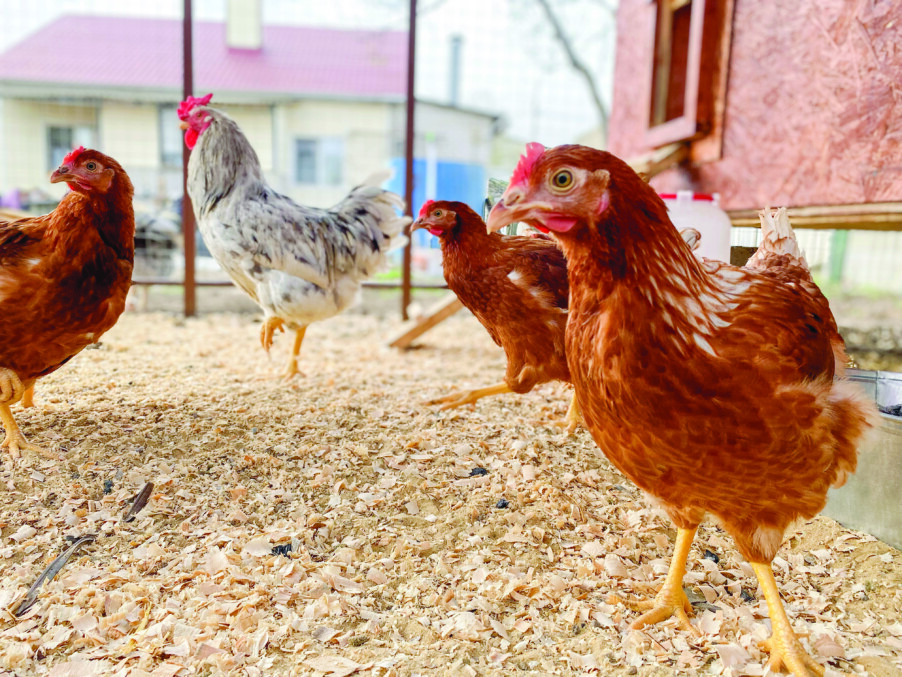The basics on adding hens, chicks and roosters to your backyard farm
Perhaps the fluctuations in egg prices have you considering getting your own flock of egg-laying chickens. A New York Times story from Feb. 2 about the “inflation chicken” trend points out that there is a hefty upfront cost to raising chickens — the cost of the birds, the cost of the coops. But if you are thinking about adding chickens to your spring and summer gardening plans, here’s what you can expect in terms of chores, costs and eggs.
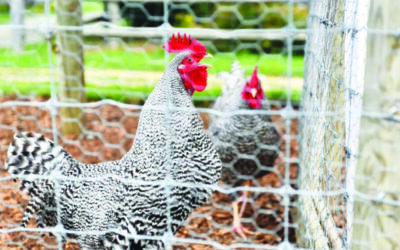
What are the regulations for raising backyard chickens in New Hampshire?
New Hampshire does not mandate statewide regulations for keeping chickens for personal use. Rather, regulations are set by municipalities and vary by town or city.
“Most towns and even cities are very chicken-friendly,” said Christine Templeton, who co-owns Templeton Family Organics farm in Goffstown with her husband, Brian Templeton.
Residents may be subject to zoning ordinances and land use laws that dictate zones in which backyard chickens are and are not permitted; the minimum acreage or lot size required; the distance maintained between chickens and neighboring residences and roads; the number of chickens allowed to be kept (which may be relative to the acreage or lot size); and rules regarding roosters.
“Some towns regulate roosters — limit the numbers or do not allow them — in residential areas,” said Mary Davis, UNH Cooperative Extension Field Specialist and New Hampshire State 4-H Animal Science program manager. “There are fewer regulations in more rural areas and areas zoned residential.”
“It is the responsibility of the chicken owner to check if roosters are allowed or not,” added Kendall Kunelius, UNH Cooperative Extension Field Specialist in Agricultural Business Management. “I always recommend checking with the town before considering purchases of any animal.”
What types of chickens do well in New Hampshire? How do I decide what type(s) of chickens to get?
There are many different breeds of chickens to consider; New Hampshire chicken experts mentioned Golden Comet, Barred Rock, Rhode Island Red, New Hampshire Red, Speckled Sussex, Australorps, Leghorn, Buff Orpington, Araucana, Easter Eggers and Wyandottes as some of the most commonly kept breeds in the Northeast.
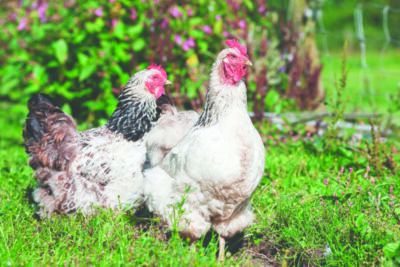
The best type of chicken for you depends on your goals.
“Why do you want chickens?” Davis said. “For the fresh eggs? For locally raised meat? Any breed of hen will lay eggs, but the popular egg-laying breeds have been selectively bred to produce more eggs per year, and ‘meat breeds’ are bred to have larger breast muscles, be bigger and yield more meat.”
New Hampshire Red, Rhode Island Red, Barred Rock and Golden Comet chickens are reliable egg-layers and tolerant to the cold, making them popular picks among New Hampshire chicken owners. Other breeds might be chosen for their more specialized egg-laying qualities.
“There’s a lot of variety among breeds bred for egg production,” said Carl Majewski, UNH Cooperative Extension Field Specialist in Dairy, Livestock, and Forage Crops, “from the modern Leghorn breeds used for commercial production, to older ‘heritage’ breeds dating back to the 1800s or so, to oddball breeds that lay different colors of eggs — anything from blue to green to chocolate brown — or have striking plumage.”
“People need to decide what is most important to them, such as high egg production, show quality or even egg color,” Templeton added. “It’s about what the person or family wants to get out of the experience.”
Backyard chicken seminar
Nashua Farmers’ Exchange (38 1/2 Bridge St., Nashua) will host a poultry seminar on Saturday, March 11, at 10 a.m. The seminar will cover the basics of raising chickens, including how to get set up and how to care for chicks and full-grown chickens. It’s free and open to the public. Visit nashuafarmers.com/events/chicken-seminar-2023.
What’s the best way to start — from eggs, chicks or grown chickens?
There are advantages and disadvantages to each, but ultimately it’s a matter of personal preference, based on the kind of experience you want and the amount of time and money you’re willing to invest.
• Hatching from eggs can be a fun and educational project for families. However, Majewski warned, it can be hard to find fertilized eggs that have been properly screened to be disease-free. Hatching also requires an incubator and other expensive equipment, and the conditions in the incubator must be frequently monitored and maintained. Finally, even if you do everything right, there’s still no guarantee that the eggs will hatch.
• Starting with chicks also requires some extra equipment, including a heat source and special food and water dispenser, and some extra care for a few weeks while the chicks are at their most fragile, but chicks are less expensive — and less risky — than hatching from eggs.
“Many farm supply stores offer pre-orders for chicks, allowing customers to order exactly what they want,” Davis said, adding that in New Hampshire an order must include a minimum of six chicks. “For those wanting laying hens, the retailer can help you determine if a chick is female. In many breeds there is a color difference of the males, although this is not 100 percent.”
It takes four months or longer from the time a female chick is born until it starts laying eggs.
• If you want to skip the wait, you can purchase “pullets” — young hens that have not started laying eggs yet but are expected to start soon.
“They save you the time and bother of brooding and rearing chicks, and they’re ready to start laying within just a week or so of getting settled in at your home,” Majewski said, “but they are more expensive. They can go for around $20 apiece, versus $3 for a chick.”
Do I need a rooster?
“It is a common misconception that you need to have a rooster for hens to lay eggs,” Davis said. “This is not true. The hens will lay eggs without a rooster.”
There is an argument to be made that hens are happier and feel safer having a rooster around, but most chicken owners who aren’t interested in producing fertilized eggs opt not to have one.
“Mature roosters are undesirable for many people,” Davis said. “They are loud, crowing not just in the morning but throughout the day. They may be aggressive to other poultry and to human caregivers, and two or more roosters may often fight one another.”
“They’re kind of obnoxious,” Majewski added. “They really do crow at an ungodly hour of the morning, and their voices can carry for a half mile — not a great way to stay on your neighbors’ good side.”
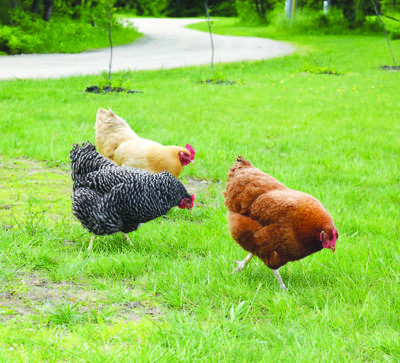
What kind of housing and essential items are needed to raise chickens?
The proper dimensions for a coop, Majewski said, should include at least 3 square feet of floor space per chicken and an additional 10 square feet of fenced outdoor space per chicken.
“This doesn’t need to be elaborate,” he said. “If you don’t have great carpentry skills, it’s fine to requisition and/or modify a portion of a shed or even the garage.”
Next you’ll need feeders and waterers — enough to give each chicken at least 4 inches of space. Supplemental heat lamps aren’t necessary for adult chickens.
“Those feathers provide remarkable insulation,” Majewskis said. “I’ve seen our birds running around outside in January with the temperature in the teens.”
What supplies are needed for maintenance and care, and what is the average monthly cost?
Feed is the main expense. Majewski said a 50-pound bag of conventional feed, which lasts a small flock a little over a month, costs around $20 to $25. A non-GMO or organic feed will cost more. Bedding for the coop — usually wood shavings — may cost around $10 to $15 and should be refreshed at least monthly, after cleaning the coop.
What’s on the chore list for raising chickens? What’s the time commitment?
Most people find a small flock of six to 12 adult chickens is easy to manage, even if they work a regular job.
“It really takes no more than 20 minutes per day to collect eggs, refill water and feed and do general wellness checks,” Kunelius said.
The only chore that you may have to set aside some time for is cleaning the coop. Majewski said most coops should “ideally be cleaned weekly, but at a minimum once per month.”
Where to buy chicken supplies
• Achille Agway, 351 Elm St., Milford, 673-1669; 65 Jaffrey Road, Peterborough, 924-6801, achilleagway.com
• Cloverdale Feed & Farm Supply, 12 Roby Road, Webster, 746-3234, cloverdalefeed.com
• Dodge Grain Co., 59 N. Broadway, Salem, 893-3739, dodgegrain.biz
• Nashua Farmers’ Exchange, 38 1/2 Bridge St., Nashua, 883-9531, nashuafarmers.com
• Osborne’s Farm & Garden Center, 16 Cinemagic Way, Hooksett, 627-6855; 258 Sheep Davis Road, Concord, 228-8561, osbornesfarm.com
• Tractor Supply Co., locations throughout New Hampshire, including Hooksett, Derry, Merrimack, Chichester, Plaistow, Milford and Pelham, tractorsupply.com
Where to buy live chickens
• Cloverdale Feed & Farm Supply, 12 Roby Road, Webster, 746-3234, cloverdalefeed.com
• Dodge Grain Co., 59 N. Broadway, Salem, 893-3739, dodgegrain.biz
• Nashua Farmers’ Exchange, 38 1/2 Bridge St., Nashua, 883-9531, nashuafarmers.com. Deadline for chick orders is March 25.
• Osborne’s Farm & Garden Center, 16 Cinemagic Way, Hooksett, 627-6855; 258 Sheep Davis Road, Concord, 228-8561, osbornesfarm.com
• Templeton Family Organics, 176 Kennedy Hill Road, Goffstown, 781-316-5067, templetonfamilyorganics.com
• Tractor Supply Co., locations throughout New Hampshire, including Hooksett, Derry, Merrimack, Chichester, Plaistow, Milford and Pelham, tractorsupply.com
Are there any safety concerns I should be aware of?
New Hampshire chicken experts mentioned three main dangers:
• Fires. Heat lamps are only needed for raising chicks; adult chickens do not need a heat lamp to stay warm during the colder months, but some chicken owners still choose to use one. In any case where a heat lamp is being used, exercise caution to prevent fires.
“Follow the safety guidelines included with your heat lamp to keep the heat source a safe distance from combustible items,” Davis said. “In the winter, water deicers can also be a fire concern. Always make sure all your equipment is in good condition and functioning properly.”
• Biohazards. “Salmonella or other bacteria can be present on birds, on eggs and in coop areas,” Kunelius said.
Wash your hands directly after handling poultry and related equipment.
In recent months, avian influenza has also been a concern with chickens and other birds nationwide.
“There is currently an avian influenza outbreak in migratory wild birds that can spread to domestic poultry and other animals. As of early 2023, there had been no human cases in the U.S. You can prevent exposure of your birds by limiting their exposure to wild birds, especially waterfowl such as ducks and geese,” Davis said. And the best way to limit that exposure is basically to have them penned up and not let them free range, she said.
• Wildlife. “Predators are a real issue,” Majewski said. “[Raising chickens] probably won’t significantly increase the number of encounters you have with wildlife, but it does affect the welfare of the birds themselves.”
Free-range chickens are at a greater risk.
“Keeping them fenced in — with adequate space, of course — is much better for all concerned,” Majewski said.
How many eggs can I expect to get, and how often?
“In peak production, a hen will lay an egg approximately every 26 hours, so you pretty much get an egg per day,” Majewski said. “A small flock of four to six hens kept in good condition will provide the average family plenty of eggs, with an extra dozen for friends and family on a regular basis.”
Older hens lay eggs at a lower rate — usually about every other day, but sometimes less.
How long do chickens live? Is it common to keep a chicken for its whole natural life?
Most chickens can live to between five and eight years. Chickens that are raised for meat are usually processed at a young age. Hens lay eggs at peak productivity for two to three years. When a hen’s laying starts slowing down, a chicken owner may make a decision about what comes next for the chicken.
“A pampered chicken can live for several years, and people have kept them for that long when they become sort-of pets,” Majewski said. “[An older hen] still lays occasional eggs, but they’re not really earning their keep. We keep ours at home for about two years, and then they make the transition from breakfast feature to, um, soup.”
Are there any benefits to raising chickens besides poultry products?
Davis said free-range chickens can help to control a variety of insects, and chickens’ manure and used bedding can be composted for later use in the garden.
“Chickens offer great tick control and fertilize your lawn,” Templeton added.
Raising chickens can be especially rewarding for families with children.
“It offers a way for families to do something together and reconnect,” Templeton said. “It is also a great way to teach children responsibility and in a world where people have become far from their food source it provides an opportunity to be close to it.”
Adopt a rooster
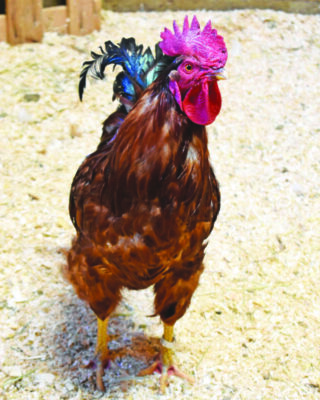
Frosty is a rooster available for adoption at the New Hampshire SPCA (104 Portsmouth Ave., Stratham). According to the NHSPCA website, Frosty was a stray found in Durham and is now looking for his perfect home. He gets along with other birds and would love to have a flock of his own.
Horhey is also a rooster available for adoption at the New Hampshire SPCA. According to the NHSPCA website, this handsome guy is very friendly and gets along with other roosters and hens. He is easygoing and would make a nice addition to any flock.
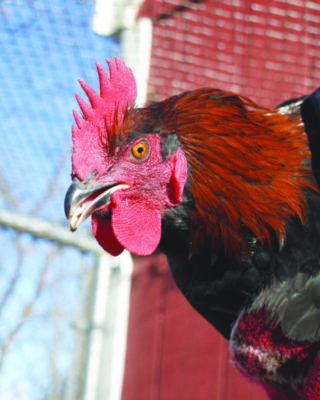
To learn more about chickens and other farm animals available for adoption at the NHSPCA, visit nhspca.org/adoptable-animals or email [email protected].

